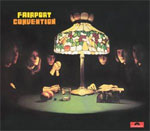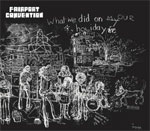What They Did In Their Early Days
| |

| What have Syd Barrett and Richard Thompson got in common ? Not that much really, but Barrett's departure from the Floyd and Thompson's exit from Fairport both took something vital and irreplaceable from both bands. And as far as I'm concerned neither outfit ever found a substitute for their guitar playing and song writing. Fortunately Thompson's abilities are very much in evidence on these two re-released and re-mastered albums. Those were the days when they were constantly touted as England's answer to Jefferson Airplane and before they came up with the musical genre they are best known for and are still touring with. Listening to these cds I can't help feeling that no matter how vital a contribution the band have made to reviving English traditional music their earliest recordings are far more interesting and worth revisiting. The eponymous first album demonstrates how eclectic this initial incarnation of the band was. They seem to have gone into the studio determined to try every style at their disposal. I know some people who think it is just too diverse and maybe lacking in cohesion but that is partly what makes it so appealing. Two Joni Mitchell covers ´Chelsea Morning' and ´I Don't Know Where I Stand' show how they could take other writers' material and transform it utterly into something uniquely their own. Judy Dyble may not have had as distinctive a voice as Sandy Denny but these songs demonstrate a certain fragile purity. Thompson was writing collaboratively at this point, with Ashley Hutchings among others, and it is hard to imagine how young he was when you listen to songs like ´Decameron' and ´Sun Shade'. These were also vehicles for the virtually flawless voice of Ian MacDonald who was the best male vocalist they ever had. No offence to the rest of the lads, of course. The Thompson/Hutchings team also produced ´It's Alright Ma, It's Only Witchcraft' showing they could rock with the best of them. But the most remarkable feature of the song is the stinging acid guitar that punctuates it. Again, it shows how prodigiously talented Thompson was. There some oddities included to, like ´M1 Breakdown', an attempt at Muswell Hill bluegrass, I think, and ´The Lobster' which is an adventurous experiment that doesn't quite come off but again has some of that blistering guitar. A further slice of stylistic eccentricity is their first single, ´If I Had A Ribbon Bow' which sounds as though it was written in the 1920s and mixes a slightly sinister ´Mr Kite' fairground organ with vibes and mellow jazz guitar. Dyble's voice is perfect for it. There are bonus tracks which show them borrowing the work of other rising stars of the time. Tim Buckley and Leonard Cohen get the Fairport treatment on ´Morning Glory' and ´Suzanne', both of which sound a little dated now. |

|
Some albums can define certain points in a life. When I first heard ´What We Did On Our Holidays' I was still in the stifling grip of an English education. I borrowed the album from my mate, Phil Morris, who was trying to help with my musical education. I played it to death and I think he had to resort to violence to get it back. I was completely mesmerised and wanted to be both Richard Thompson and Ian MacDonald, though now he was Mathews. I soon bought my own copy and played that to destruction as well. I still have a copy on real heavy duty vinyl. Now the re-mastered cd is getting played over and over. It has withstood the passage of time and is entirely redolent of an era when I was a ´windy boy and a bit', discovering music and poetry in huge doses. It shows that they were finding their own sound and has less of the extremes of the first album. It also features the voice of Sandy Denny. Her ´Fotheringay' opens the album and sets some of the tone, blending acoustic guitars and Hutchings' melodic bass with her own sublime vocals and lyrics. Her writing was an important addition but at this stage Thompson was also writing more and without collaborators, for the most part. ´Meet On The Ledge' still features in the band's repertoire but ´No Man's Land' and ´Tale In Hard Time' hinted at the emergence of a darker side to his lyrics despite the up-beat nature of the music. There is less reliance on other singer's songs though both Dylan and Joni Mitchell have credits. The latter's ´Eastern Rain' continues the band's flair for creative and attractive arrangements that was evident on the previous album. And talking of material written by others, the album sees them dipping a tentative collective toe in the wealth of the tradition. ´Nottamun Town' is as fresh now as it was then, setting the powerful voices chanting the riddling lyrics against the sparse acoustic guitar, bass and percussion. Again, Thompson pulls off a solo that still makes the hairs rise. Another song which is described as ´traditional', ´She Moves Through The Fair', is perhaps the highest of several high spots on the album. Restrained guitars from both Simon Nicol and Thompson underpin Denny's flawless voice while Hutchings and Martin Lamble provide the pulse. It is, no question, a small masterpiece and the poet Padraic Colum's words, slightly adapted, send shivers down the spine. There are bonus tracks which hint at the somewhat rougher ´live' feel of their next outing ´Unhalfbricking', and that's another chapter entirely. But had they ceased to exist then this recording would have been a lasting monument to them. Instead there was a whole other, well documented, future awaiting them and one that would take the band further away from this wondrous and timeless set. © 2003Paul Donnelly |